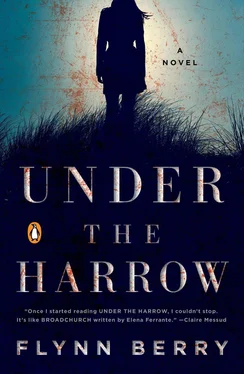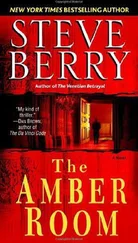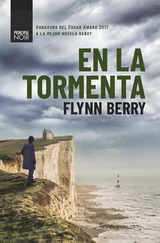We were on a trip to Rome, visiting a lemon grove outside the city. “You were right,” she said. She scratched her fingernail across the skin of a lemon and sniffed it. “It’s time to stop.” That night we feasted on pasta and wine. A celebration. I thought it was finished.
“Five years ago, she told me she would stop looking.”
“What form did looking take?” asks Moretti.
“We read the newspapers.” We read about every rape, assault, and murder in Yorkshire, including ones from the recent past. It did my head in. I won’t take cabs alone because of one story. “And in the beginning we also went into Leeds and Hull.”
“Why?”
“He might have come on the train.”
“Did you think that or did Rachel?”
“She did, I think.”
“Do you know why?”
“No. Who are the other two men?”
“Actors,” says Lewis. “It’s a photographic lineup.”
“Why did you think it was that man?” I ask.
“He left Whitemoor Prison three weeks before Rachel’s death,” says Lewis. “The way he killed the young woman in Leeds is similar to the first attack on Rachel, and at the time of Rachel’s assault, he was living in Hensall, near Snaith.”
“No,” I say. “He didn’t attack her then.”
They continue to interview me about the assault. They ask about the people we knew, even after I tell them that Rachel could see his face during the attack and was certain she didn’t recognize him. Andrew Healy must look similar to him, though she would have accounted for the possible changes in fifteen years, how his face might thin or thicken, and age. They take notes. I think of the sort of police officers who hold press conferences during a major inquiry, and wonder if any of them would have solved this already.
OUR DAD WAS not camping, but staying with a friend in Sunderland who had helped him get a job on a building site. When I finally spoke with him on Rachel’s third day in hospital, I told him she had broken her ankle. “Can you call Selby Hospital and say she’s fine to leave with her sister? Here’s the number.”
This shouldn’t have worked, but it was a crowded NHS hospital and they probably needed her bed.
On Rachel’s last day in hospital, Alice borrowed her mum’s car and we drove to pick her up. On the return trip, Rachel was quiet, and I wondered if despite what she’d said she was scared to come home.
Alice and I had spent the morning preparing. We rented six films. We bought two pints of wonton soup and chow fun. We drove to the Italian café in Whitley for a quart of hazelnut ice cream. I bought a bottle of cleaning fluid — not the sort of thing in supply at our house — and scoured the bathtub. I had the idea that Rachel, who had never done so before, might want to take a bath. And, in a stroke of genius, we borrowed a friend’s dog, a cream-colored Labrador retriever puppy.
Rachel didn’t even ask whose it was. It was the wrong kind of dog, I realized later. Not a Doberman pinscher, for example. We could have tried to borrow one of those, there were plenty in Snaith and on the farms around it. When she saw the dog, she must have realized how little the two of us understood.
Rachel moved slowly up the stairs and into bed. The blind was still snagged up in one corner, and golden afternoon light glowed on her arm. She scrabbled her hand for the duvet and pulled it to her chin. I lay beside her but faced the room, the heaps of clothes, the stacks of books, the empty bottles of Jamaican beer, packs of cigarettes, and scorched lighters. Her mirror leaned on the floor, and next to it were a radio and a few gold tubes of lipstick.
The room was messy but still somehow spare. She didn’t curate it for anyone else, and unlike me she didn’t display mementos. No matchboxes unless she needed matches. The only wall decoration was a carnival mask with a nose curved like a beak that she had found on a road in Leeds, abandoned, probably, after a party.
I wondered what she made of it now. She hadn’t seemed to look at the room at all on her way to bed. We lay with our heads turned in opposite directions on the pillow and listened to the dog whining downstairs.
Soon after leaving hospital, Rachel bought a blackjack from Rafe’s older brother. God knows where he got it. It was a small metal rod, like a police baton but smaller. “If it’s what the police use instead of a gun, it has to be one step down from a gun, doesn’t it?” she asked.
That first night, Alice made us hazelnut milk shakes, which we drank while watching an animated film about foxes. Rachel said she wasn’t hungry because of the pain medicine. She twitched often. None of us looked at one another, or at the door, or the window. We kept our eyes on the small screen as night fell.
• • •
The next day, she said, “I’m going to Hull. Do you want to come?”
“Why?”
“I need to do some shopping.”
Rachel had never, to my mind, needed to do any shopping. For one thing, she didn’t have any money.
We rarely went to Hull. We went to Leeds more often, to the Warehouse, the Garage, the Mint Club. During the day, we bought kebabs and merguez rolls and watched the university students in the main square.
It was not, I thought, what Rachel should be doing at the moment. She should be resting. She had not taken a bath yet.
I followed her around Hull, into betting shops, into pubs. People stared at us. She still had her stitches in, and her face was bruised and swollen. When the train conductor asked what had happened, I waited for her to lie and say a road accident. Instead she said, “I was beat up. He is about six feet tall, has black hair to his chin, and was wearing a canvas jacket. He has a long narrow face and you can see the bones in his forehead.” She ran her finger up the edge of her forehead to demonstrate and then wrote something on the back of her ticket receipt and gave it to the conductor. “This is my number, if you see him.”
We spent the entire day in Hull, and the next, and then we went to Leeds. These trips were excruciating. Rachel still couldn’t walk without pain. Watching her limp in and out of shops and pubs filled me with a pity that made it difficult to breathe.
I knew we wouldn’t find him, and on the return trip we were both frustrated and miserable. She spent the walk home from the train hoping we’d see him, and I spent it begging that we wouldn’t.
The police did not help. Rachel went to the station and spoke to a detective constable who spent the entire interview asking her for information about the flow of drugs into Snaith. Aside from his face, the only thing Rachel had to go on was that she thought she heard his voice. His accent sounded like ours, she said. He was local.
We assumed he was poor, because we were, and he was in our town. We went to the places our father would go. The tracks. The pubs. Where would a violent man go, where would a monster go. It was hard to know what someone who liked hurting women would also like.
THE BODY OF the missing woman I heard about on the day of Rachel’s death was found this morning in the River Humber. Nicole Shepherd. Divers were in the river examining the posts of the bridge at Hessle, which is overdue for repairs, and they found her body in a sleeping bag weighted with breeze blocks. Whoever it was threw her from the center of the bridge, but the river isn’t very deep by Hessle, only thirty feet, and the current isn’t strong.
My stomach twists while I read the rest of the article, hunched in my coat at one of the tables outside the inn, holding the paper down with my forearms against the wind. Of course she came to harm. I wonder if they can figure out who owned the sleeping bag.
Читать дальше












